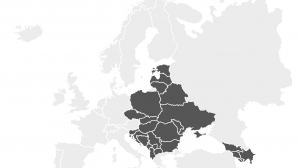Make-up and cosmetics sales in Poland in 2017 topped 2 billion zloty for the first time ever. In 2018 sales in the sector are expected to increase by a further 5 per cent, which according to a report from Euromonitor International, makes Poland’s growth twice as high as any other market in the central and eastern European (CEE) region.
Colour cosmetics are fuelling the growth of the beauty market in Poland. Success in 2017 was in a large part due to some outstanding marketing campaigns. Alongside global giants L’Oréal, Avon, and Coty, a number of domestic players have also found themselves space on the market.
“The coloured cosmetics segment is not only a key driver of the growth in the beauty industry, but also the second largest category in the entire chemical-cosmetic basket,” says Agnieszka Majewska, director of marketing CEE for Coty Consumer Beauty.
According to research carried out by Nielsen, Coty (including other brands in the group such as Bourjois, Miss Sporty and Max Factor) is the market leader for coloured cosmetics in Poland, with a 29.2 per cent share.
Polish players
The leading Polish players in the cosmetics care market include Inglot, Eveline, Dr Irena Eris and Oceanic Cosmetic Laboratories. Another domestic brand seeing success is Bell, which produces around 50 million pieces of cosmetics per annum and is the main supplier of make-up products in over 2800 Biedronka stores.
A report on the state of the cosmetics industry in Poland prepared, among others, by Deloitte shows that between 2004 and 2016, the sales of Polish cosmetics to European Union countries increased almost nine times (the balance increased from 231 million zloty to 2.04 billion zloty).
“It is difficult today to determine where care ends and where make-up starts. Make-up products combine many functions,” says Leszek Kłosiński, president of Gdańsk-based company Oceanic, which debuted last year with the AA Wings of Colour brand. “The debut of the brand, which combines make-up and care, was very successful, and helped by the distribution in the Rossmann network,” adds Mr Kłosiński.
On the other hand, brands such as Dr Irena Eris, the flagship brand of Dr Irena Eris Cosmetics Laboratory, have changed their strategy and have reduced or even retired from selling their products in drug stores (such as Rossmann) after being widely available in high street retails chains for the last four years. This change in direction is another step towards the brand strengthening its position as a luxury brand, being available only in selected perfumeries.
Inglot
Inglot, another Polish cosmetics company, had a great year in 2017 and has started 2018 with a bang, launching a new line in partnership with Jennifer Lopez. The company officially launched a new and limited line of make-up at the end of April for the global market, developed in cooperation with the actress and singer. The star influenced both the marketing campaign as well as the selection of cosmetics and the appearance of packaging in the series.
“The capsule collection we created with Inglot is filled with all my go-to products in my favourite colours. We have everything from mascara, lipsticks, eyelashes, blush, eye shadow and of course… bronzers,” said Ms Lopez at the launch of the range.
Inglot has been operating in international markets for over a decade, opening its first store in the UK in 2008. Jowita Kotuła, a representative from Inglot, explains that the key to success is to adapt to the requirements of the local market.
“In the United Kingdom, the challenge is the huge diversity of society. We had to offer products for all types of skin and respond to very different preferences of customers, also socially and culturally conditioned. The omnipresent competition is also important. The upside is definitely that Great Britain is a large and affluent market with high consumer awareness,” said Ms Kotuła.
For Polish companies, exporting cosmetics to the United Kingdom can be seen as a dream come true. However, companies are aware that Brexit could potentially cause problems. Undeterred, Piotr Bielski, an economist from Bank Zachodni WBK, believes that the potential economic slowdown is a blessing rather than a curse for Polish manufacturers.
“In the period of the downturn in Germany, consumers stopped buying household appliances from more expensive brands and reoriented towards comparatively good products, but at a lower price, often imported. If the economy of the UK slows down, it can be assumed that British consumers will be more open to less known, slightly cheaper brands, including those from Poland,” said Mr Bielski.






Add Comment